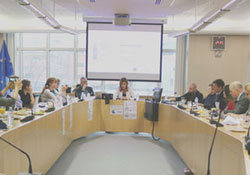WHO highlights link between alcohol and cancer at the European Parliament

European Liver Patients' Association (ELPA)
As part of the 5th Awareness Week on Alcohol Related Harm, WHO raised awareness on the close link between alcohol and cancer at the European Parliament. On 23 November 2017, Dr Marilys Corbex, Senior Technical Officer in the Division of Noncommunicable Diseases and Promoting Health through the Life-course at WHO/Europe, explained to an audience composed of members of parliament, health attachés and representatives of civil society that “the link between alcohol and cancer is often overlooked. With 1 in 8 alcohol-related deaths in the WHO European Region due to cancer, limiting the availability of alcoholic beverages can have a marked effect on cancer death rates.”
Dr Corbex emphasized the importance of countries taking action by implementing the 3 “best buys” recommended by WHO:
- regulation of the commercial and public availability of alcohol;
- restrictions or bans on alcohol advertising and promotion; and
- pricing policies such as tax increases and a minimum price per unit of alcohol.
The Region has the highest proportion of total ill health and premature death due to alcohol. One fifth of the population aged 15 years and above reports heavy episodic drinking at least once a week. Alcohol is known to be a causal factor in over 60 diseases and conditions, including at least 7 types of cancer (mouth, upper throat, larynx, oesophagus, breast, liver and colorectal cancers).
Even light drinking increases the risk of cancer; for example, women who drink 1–3 alcoholic beverages per week increase their risk of breast cancer. The heavier the alcohol consumption, the higher the risk of developing cancer becomes; for example, the risk of mouth and oropharynx cancer is 100% higher in people who drink a 250 ml glass of wine per day than in people who drink no alcohol, and 500% higher in people who drink 4 glasses per day.
Currently, alcohol consumption is declining too slowly to reach to the Sustainable Development Goal (SDG) acknowledging the significant impact of harmful alcohol consumption on health. SDG target 3.5 sets out to “strengthen prevention and treatment of substance abuse, including narcotic drug abuse and harmful use of alcohol”.



